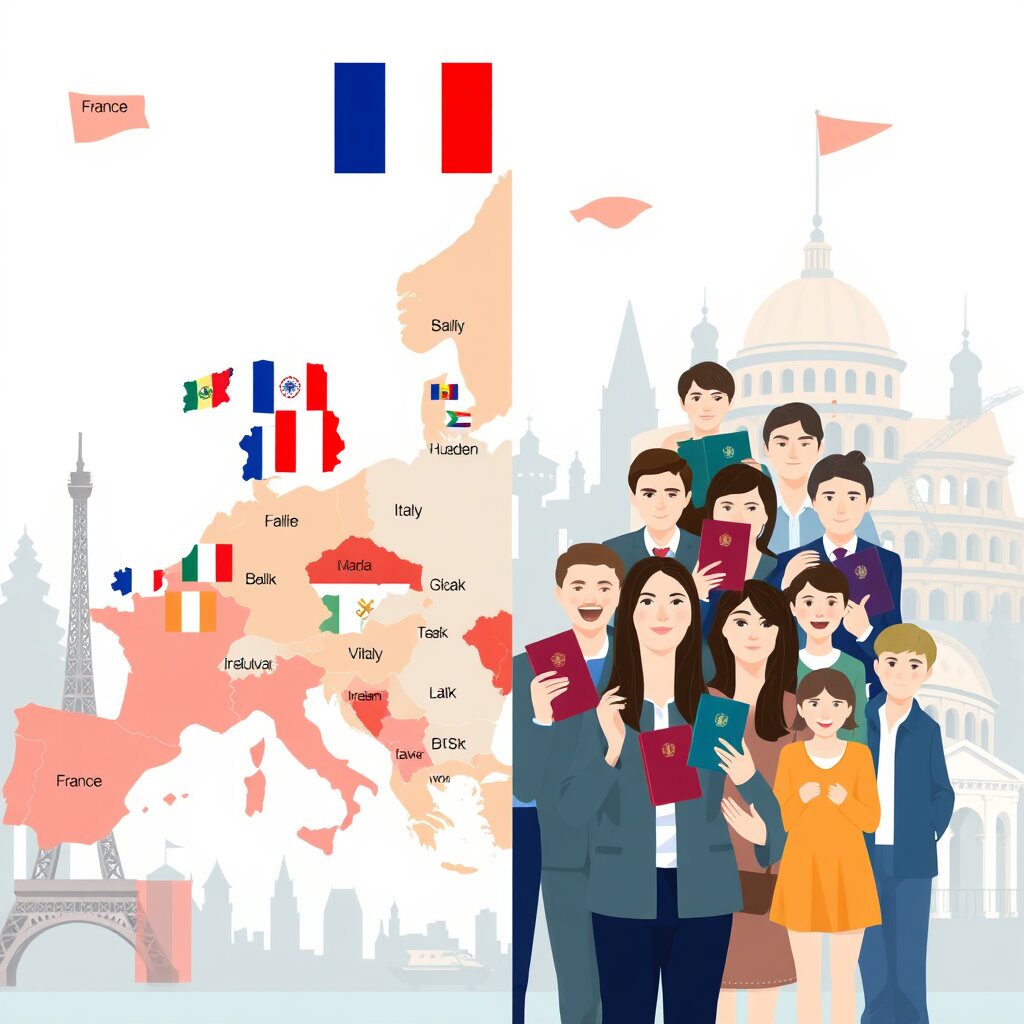More and more people are considering dual citizenship through overseas study, marriage, and investment immigration. In particular, Europe is attracting attention because it has various nationality policies along with historical and cultural backgrounds. Today, we will summarize the strengths and weaknesses of dual citizenship in Europe and the major policies of each country.
🌍 Why dual citizenship is important in Europe
Dual citizenship literally means having two or more nationalities at the same time. Since Europe is a mixture of EU and non-member states, and each country’s laws are different, their attitudes toward dual citizenship are different.
In particular, if you hold EU member status, you can automatically enjoy freedom of residence, employment, and study in other countries within the EU. For this reason, dual citizenship in Europe is an issue that is attracting worldwide attention.

✅ Advantages of dual citizenship in Europe
freedom of residence and employment
For example, if you have dual German and Italian citizenship, you are free to work and live anywhere in the EU country.
educational benefits
European nationals can enjoy tuition benefits, which is advantageous for studying abroad or exchange students.
a social security system
Health insurance, pensions, and welfare benefits are available in both countries at the same time.
Expanded visa waiver
European nationality allows you to enter many countries around the world on a visa-free or simple visa.
⚠️ Disadvantages and risks of dual citizenship in Europe
a tax problem
Since some countries apply the principle of global income tax, both countries are likely to pay taxes at the same time.
military duty
Some European countries, including Greece and Turkey, still mandate military service, which could lead to service problems for dual nationals.
the state of diplomatic conflict
In the event of an international dispute or diplomatic issue, it may be unclear which country is eligible for protection.
a legal conflict
The laws of the two countries can conflict in inheritance, marriage, and child nationality.
🏛️ Dual nationality policies by major countries
Germany: By default, dual citizenship is restricted, but exceptions are allowed for EU member states and those from Switzerland.
France: Relatively tolerant of dual citizenship and does not lose French citizenship when acquiring foreign citizenship.
Italy: It’s very flexible, and it’s easy for overseas compatriots to restore or retain their Italian nationality.
Spain: Restrict dual citizenship, but allow dual citizenship with Latin American countries, Portugal, and Andorra.
Greece: allows dual citizenship, but military service issues exist.
UK (non-EU): It allows dual citizenship and has a system favorable to people from Commonwealth countries.

📌 Recent issues related to dual citizenship in Europe
The post-Brexit British nationality issue
As the U.K. left the EU, its citizens lost their free right to move within it. This made headlines for dual citizenship of Great Britain-Ireland and Great Britain-France.
immigration growth and nationality conflict
As the number of immigrants from the Middle East and Africa increases, legal discussions on dual citizenship continue actively in European countries.
Strengthen anti-tax evasion policies
As the OECD and the EU have strengthened global tax avoidance prevention, the tax problem for dual citizens has also become more difficult.
💡 Organize
Dual citizenship in Europe can be a huge opportunity, but at the same time comes with legal and tax risks, so rather than simply deciding because it’s “looking good,”
nationality laws of each country
Taxes and military service obligations
a long-term residence and living plan
It is necessary to prepare after careful examination of the back.
👉 If you are considering dual European citizenship, it is safe to consult a professional lawyer or administrator to find the best way to suit your situation.
👉 If you look at it together, I recommend a good article.
